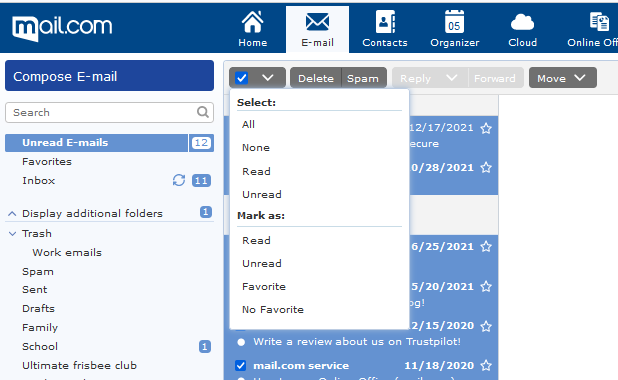How do I empty my mailbox? A step-by-step guide

Help! My mailbox is full
Maybe you’ve received an error message telling you that you’ve almost reached your email storage limit, or maybe you’re just drowning in messages and overwhelmed at the thought of cleaning your inbox. Either way, mail.com can help!
What happens if you have too many emails in your inbox?
Most email accounts have an email storage limit – for example, mail.com offers 65 GB of email storage, which equates to about half a million messages. But if you have an email provider with less generous limits, or you rarely delete emails, you may find yourself facing a message that your mailbox is full. This could have several consequences:
- You won’t be able to send new messages
- People who send you email will receive a bounce message telling them your mailbox is full
- Even if your email hasn’t quite reached full capacity, you may become overwhelmed by the sheer number of emails in your mailbox – you can’t locate addresses you need or important emails get lost in the clutter
What do I do when my mailbox is full?
Never fear: In a few easy steps, you can empty your mailbox and set up a system that will keep your emails organized going forward.Your checklist for emptying your inbox:
- Sort emails quickly using inbox search filters
- Save important addresses and attachments
- Unsubscribe from newsletters
- Filter and block spam emails
- Use email rules to sort incoming mail
- Empty email folders automatically
- Set up Cloud folders to organize files
- Use different addresses to keep emails sorted
Take a minute to cast a critical eye over your inbox. Which emails and folders do you actually still need, which have served their purpose and can be deleted? Follow these steps to free your inbox from clutter
Sort and delete emails quickly with inbox search
Are there emails from a specific sender you no longer need to keep – like messages from a teacher at a school your child has long since graduated from? No need to scroll through your inbox and delete each message manually. Whether you log into your mail.com account in the web browser or use a mail program like Outlook, the inbox search bar can be your decluttering buddy.Delete unwanted mails in mail.com mailbox:
To identify emails that you’d like to enter, go to the E-mail tab and locate the inbox search bar on the left under your “Compose E-mail” button.- Type in the sender’s name or other search term
- A list of all messages from that sender will appear
- Select all the messages by choosing “All” in the dropdown menu next to the delete button
- Move all the selected messages to your Trash folder by clicking “Delete”.

The inbox search is also your friend if there are lots of emails from a certain sender in your inbox that you’d like to move to a specific folder rather than deleting them. Create a folder if needed, perform your search and select all the emails as described above. Now you can move them to the folder all at once. Simply click “Move” instead of “Delete” and select a folder you’d like them to go to.
Clean up your inbox in Outlook
Outlook also has an inbox search bar you can use to identify emails you’d like to empty from your inbox:- Type in your search term and click the search symbol
- A list of emails that meet your criteria will appear
- Select all the messages by pressing the [Ctl] + [A] keys
- Right-click with your mouse to open a context menu
- Click “Delete” to move the selected emails to your trash folder
- Alternatively, you can select “Archive,” which moves the emails to a folder on your hard drive or Onedrive.
Good to know: Recovering deleted emails
When mass deleting emails, you may be worried about deleting an email you still need. No worries: emails are retained in your Trash folder for a certain amount of time – with mail.com, the default retention time is 30 days. So if you accidently delete an important email, there is a good chance you can locate it in your Trash folder. Then all you have to do to restore it is click and drag it back to your inbox or the desired folder.Save addresses and attachments
Are there emails you’ve been keeping just so you’ll have the person’s address or because there is a file attached? Now is the time to save those contacts to your address book – this makes it easier to add them as an email recipient in future and helps keep emails from this sender out of your Spam folder. And it couldn’t be easier – simply open the email, click on the recipient name, and select the option of adding it to your contacts. Now you can delete that email as well.The same applies to emails you are keeping in your inbox because of their attachments. Saving the attachments to your device’s hard drive or your Cloud storage will also make them easier to find. Open the email, click on the attachment, and choose whether you’d like to download it or save it to your online storage.
Unsubscribe from and delete newsletters
Often we agree to receive newsletters or advertising, but then lose interest in the company or decide the resulting inbox clutter isn’t worth it. Nowadays newsletters are required to have unsubscribe options that you should take advantage of. If there are newsletters you still read but don’t like the way they clutter your inbox, consider creating a Newsletter folder and emptying it regularly (see below).Don’t delete spam – block it instead!
During your inbox cleanse, you may find some spam emails lurking in your inbox. It's important not to delete them! Instead, mark them as spam or drag them to your Spam folder. This helps “train” your inbox spam filter, meaning emails from that sender will automatically go to Spam in the future and you won’t have to see them.If you notice a repeat offender among these spam senders, you can also block emails from a specific sender address or domain by adding it to your personal blocklist.The emails in your Spam, Trash, and other folders count toward your email storage limit. So it’s possible that your folder contents are taking up too much space even if your inbox is (almost) empty. A quick fix can be deleting all the emails in your Spam or Junk folder and emptying your Trash. You can set then set custom storage limits for all your folders so that emails are only retained for a certain period, then automatically deleted, as described below.
Keep your inbox organized going forward
Whew – you did it! Take a moment to admire your clean and shiny inbox. Visualize how keeping it clean will benefit your productivity and lower your stress: Important emails from your clients or your kid’s teacher will no longer disappear in the clutter. You’ll be able to instantly locate important messages and email addresses whenever you need them.Now let that wave of motivation carry you forward: Apply these four simple life-hacks to keep your inbox from getting cluttered again:
1. Set up email filters
Are there certain categories of emails you’d like to be able to find more quickly, like invoices, newsletters or emails from your mother? You can automatically filter incoming messages so they go straight where you want them. If you have a mail.com account, it's easy to set up filter rules.2. Set storage time limits for folders where appropriate
If you use folders to organize your inbox, you can customize any folder’s settings to delete the emails it contains after a defined time so you don't have to worry about cleaning out old emails manually. Don’t forget to check your system folders, like making sure your Trash is being emptied at suitable intervals.3. Set up folders in your email’s cloud storage
This lets you quickly save any attachments and photos you receive. If the folders are set up in advance, you can save attachments to the cloud with a single click and delete the email from your inbox immediately.4. Create alias email addresses for different uses
Sometimes it makes sense to have seperate email addresses e.g. for work, family and friends, or shopping/newsletters. For example, mail.com lets you create up to 10 addresses within a single account. Then you can use automatic filters to keep your incoming emails completely separate and never have to untangle them manually again.So what are you waiting for? Make a clean sweep of your inbox today. And if you found our suggestions useful, please give us a thumbs-up below!
This article first appeared on May 20, 2021 and was updated on July 27, 2023.
Images: 1&1/Shutterstock
702 people found this article helpful.
Related articles